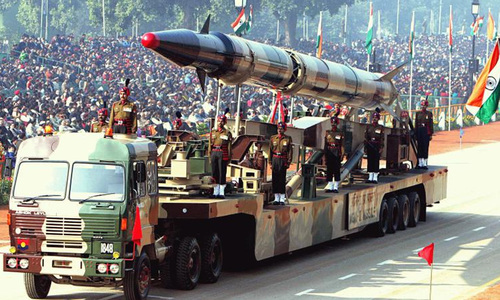The Missile Technology Control Regime (MTCR) is an 'elite' 35-nations club that seeks to control exports in missile and unmanned aerial vehicle (UAV) technology. The latest addition to the regime is India, whose membership was confirmed earlier this week.
The regime was established in 1987 by the Group of 7 (G7) countries — United States, Canada, France, Germany, Italy, Japan, and the United Kingdom — with the aim to address the increasing proliferation of nuclear weapons "by addressing the most destabilising delivery system for such weapons".
MTCR members are especially expected to restrict their export of rockets and UAV technology capable of delivering a payload of at least 500kg to a range of at least 300km.
In 1992, the MTCR extended its scope on missiles for nuclear weapons delivery to a focus on the proliferation of missiles for delivery of all types of weapons of mass destruction (WMD) — including nuclear, chemical and biological weapons.

The MTCR guidelines are also designed to limit the risk of controlled items and their technology falling into the hands of terrorist groups and individuals, but the group does not intend to "impede national space programmes" through its policies.
The regime's list of controlled items (the MTCR Annex) including equipment, materials, software, and technology needed for missile development is divided into two segments: Category I and Category II items.
Category I encompasses items of greatest sensitivity including rocket and UAV systems (including ballistic missiles, space launch vehicles, sounding rockets, cruise missiles, target drones, and reconnaissance drones) while Category II items include less-sensitive and dual-use missile related components.
How the MTCR works
All MTCR decisions are taken with consensus of all members, including the admission of new members.
In order to gain entry into the exclusive group, a country must demonstrate a sustained and sustainable commitment to non-proliferation.
The country should also have a legally based effective export control system that implements the MTCR guidelines, and administers and enforces such controls effectively.
The regime does not have an observer category for prospective members.
All member states are expected to adhere to MTCR's common export policy guidelines applied to an integral common list of items and they are required to apply licence authorisation requirements before export of items listed in the MTCR Annex.
Authority over members
The MTCR is an informal, voluntary regime with no legally binding obligations or penalties for violators. The only activity prohibited absolutely by the Guidelines, to which all members voluntarily subscribe, is the export of production facilities for Category I MTCR Annex (greatest sensitivity) items.
Additionally, the regime does not distinguish between exports to member and non-member countries. However, the United States has a legally prescribed distinction for MTCR members through which transfer of technology or missiles to a non-MTCR country is restricted.
Why countries seek to become members
According to the MTCR website, by gaining the regime's membership countries "can play an active role in curbing the global missile non-proliferation threat".
"Partners also benefit from discussions and exchanges of information on licensing, interdiction, best practices, and cooperate to impede specific shipments of concern with regards to missile proliferation."
Despite its interest in export control regimes and possessing a fairly advanced missile programme, Pakistan has never sought membership of the MTCR although government officials say the country will apply when "the time is right".
China has been seeking to become a member since 2004, but it has failed to get the group's consensus. However, recent reports indicate China is having second thoughts about the regime's utility.
“We have noted that some of the multilateral export control regimes have changed in one way or another. With that in mind, China is assessing the effectiveness of the MTCR in safeguarding the international non-proliferation regime,” Chinese foreign ministry spokesman Hong Lei said in a media briefing in Beijing.












































